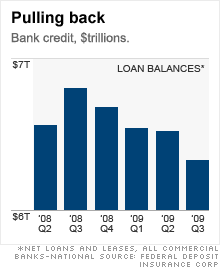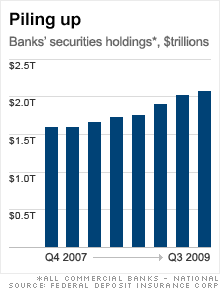No lending, no recovery
Loans keep falling as banks tidy up their balance sheets. Can the economy grow without their help?


NEW YORK (Fortune) -- In an ominous sign for the recovery, bank loans are drying up faster than ever.
Loan balances at commercial banks fell at the fastest clip in at least 25 years in the third quarter, the Federal Deposit Insurance Corp. said Tuesday.
Outstanding loans have fallen every quarter since last fall, when the collapse of Lehman Brothers and other big financial firms turned a recession into a full-fledged financial crisis.
But the third quarter decline was the sharpest yet, leaving banks' balance sheets 7% smaller than they were at this time a year ago.
The falloff in bank lending is fueling worries that a taxpayer-financed economic recovery could run out of gas as borrowers scrounge for credit. The concern is particularly acute for the small businesses that account for much of U.S. job creation.
"There are people with legitimate projects out there who cannot get loans, and we can't sustain a real recovery without access to credit," said Brian Olasov, a managing director at law firm McKenna Long & Aldridge who focuses on real estate finance.
The lending pullback comes even as the biggest institutions such as Bank of America (BAC, Fortune 500), Citi (C, Fortune 500) and JPMorgan Chase (JPM, Fortune 500) enjoy generous government subsidies -- including the Federal Reserve's decision to hold down short-term interest rates, which cuts bank funding costs.
At the same time, they have been talking up their lending activities.
Bank of America, for instance, boasted last month in its third-quarter financial results that it "extended $183.7 billion in credit during the quarter." But it ended the quarter with fewer loans than it started with, as loans fell by $28 billion.
Similarly, JPMorgan Chase said in its third-quarter report that it "continues to help consumers and communities in this challenging economy." But its loan book shrank 4% during the quarter and 14% over the past year.
Meanwhile, banks are funneling more of the low-cost funds they get thanks to the federal deposit guarantee into securities. Bank holdings of Treasurys soared 49% in the latest quarter, the FDIC said.
The banks are pulling back on lending after the U.S. enjoyed a decades-long credit expansion, fueled in part by bank loans and in part by the growth of securities markets.
Since investors fled the market for privately issued mortgage debt in 2007, once-thriving securities markets have shriveled.
Companies issued $753 billion worth of securities backed by car loans, credit card borrowings and other so-called asset backed securities in 2006. That number shrank to $139 billion last year, according to the Securities Industry Financial Markets Association, and totaled $118 billion through the third quarter of 2009.
The collapse of securities issuance limits borrowers' options and could steer more opportunities to the banks. But they are busy cleaning up after soured residential and commercial loans.
Loans charged off as uncollectible nearly doubled from a year ago in the third quarter, to $136 billion, the FDIC said.
Meanwhile, consumers are coming off a debt binge of their own and trying to mend their own tattered balance sheets.
"The consumer is cutting back as the banks are trying to hack down their loan books," said Dan Seiver, a finance professor at San Diego State. "It's not surprising, but it's not good news for the creditworthy small business that can't get money to expand."
That banks are shrinking their balance sheets at a time when the economy is sputtering and consumers are strapped is no surprise, Olasov said. He said the lending slowdown offers a sobering reminder of banks' limitations.
"The choice for the banks is very stark," he said. "You can either repair your balance sheet or you can build your loan portfolio, but you can't do both at the same time." ![]()
-
 The retail giant tops the Fortune 500 for the second year in a row. Who else made the list? More
The retail giant tops the Fortune 500 for the second year in a row. Who else made the list? More -
 This group of companies is all about social networking to connect with their customers. More
This group of companies is all about social networking to connect with their customers. More -
 The fight over the cholesterol medication is keeping a generic version from hitting the market. More
The fight over the cholesterol medication is keeping a generic version from hitting the market. More -
 Bin Laden may be dead, but the terrorist group he led doesn't need his money. More
Bin Laden may be dead, but the terrorist group he led doesn't need his money. More -
 U.S. real estate might be a mess, but in other parts of the world, home prices are jumping. More
U.S. real estate might be a mess, but in other parts of the world, home prices are jumping. More -
 Libya's output is a fraction of global production, but it's crucial to the nation's economy. More
Libya's output is a fraction of global production, but it's crucial to the nation's economy. More -
 Once rates start to rise, things could get ugly fast for our neighbors to the north. More
Once rates start to rise, things could get ugly fast for our neighbors to the north. More







